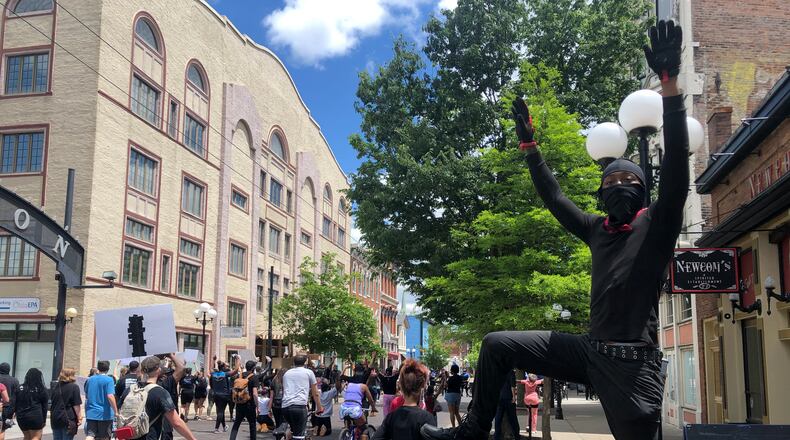The Dayton-area collective of the Ohio National Lawyers Guild, a local group, says it is outraged and disturbed that the public only learned about the CBP’s activities in Dayton through news reports.
The group has demanded changes and transparency around how the police department requests federal law enforcement support.
“Dayton’s request for assistance from CBP — an agency notorious for its unlawful use of force and poor internal oversight mechanisms — in policing Black Lives Matter protests is antithetical to the city’s alleged commitment to addressing police misconduct and reform,” the organization said in a prepared statement.
Dayton’s elected leaders this week raised some concerns about the process the police department have used to request this kind of help from outside federal authorities.
City officials said they have made changes to ensure requests are approved by the city manager.
“We are having significant issues and disagreements around the movement of the federal government,” said Dayton Mayor Nan Whaley. “I’m not comfortable with anybody but the city manager making that decision.”
On Wednesday night, Dayton City Commissioners Darryl Fairchild and Matt Joseph asked city management to talk about the police department’s decision to request air support from federal authorities during a racial justice protest.
Fairchild and Joseph said they were contacted by residents who were troubled by the flight.
Some people across the country have sharply criticized CBP officers for responding to anti-racism protests in Portland, Oregon, and other cities. They decried reports of federal agents, acting as “Trump’s troops,” using force against demonstrators.
CBP officials say federal authorities are helping to stop looting, rioting and violent acts in Portland and elsewhere.
Deputy City Manager Joe Parlette said the Dayton Police Department has requested aerial support from various agencies four times in the last two years.
Last year, police requested air support during the annual St. Patrick’s Day celebration as well as during the KKK-affiliated hate rally in downtown, he said. The Ohio State Highway Patrol is usually the preferred agency of choice for this kind of assistance, he said.
On May 31, the second day of the Floyd protests, the city requested and received air support from the Butler County Sheriff, officials say.
On June 6, Dayton police requested air support from the Department of Homeland Security for a rally in Dayton that ended up being not as large as expected, and the helicopter was dismissed within an hour, Parlette said.
That day, about 300 people gathered in Courthouse Square and then marched through downtown and the Oregon District in a peaceful demonstration.
A week earlier, there were much larger protests downtown, and at times police and protesters clashed, with officers deploying chemical spray, tear gas and firing non-lethal ammunition.
Dayton police lieutenants and majors are authorized to make a request for air support, but senior command staff are consulted when that happens, Parlette said.
However, Parlette said city administration has instructed Dayton police Chief Richard Biehl to amend the process of requesting federal help.
From now on, he said, the requests must come from the chief or assistant chief, and they must receive the city manger’s approval.
Commissioner Joseph said sometimes the city will need federal help, like during the hate rally, which drew large crowds and there was potential for violence.
But he said there are other times when federal assistance is not wanted or needed, and he wants to make sure there is clear criteria for when it is appropriate to make that decision.
He said the city manager and commission need to know when the police department makes these requests and what exactly they ask for.
He said this is important because the federal government has “gone off the rails” in many ways, and the city needs to be careful how it works with and calls in federal authorities.
CBP said it provided aerial assistance for civil disturbances in 15 cities, which included surveillance by manned and unmanned aircraft. The agency’s aircraft were in flight nearly 230 hours, agency data show.
The draft document obtained by The Nation states that CBP received a request from the Dayton Police Department to provide transportation of Dayton police and “enhance” officer safety and situational awareness.
The Dayton-area collective of the Ohio National Lawyers Guild said Dayton’s request to the CBP indicates an ongoing intention to surveil people for expressing their support for the movement for Black liberation.
“The safety of the community, and especially organizers working in the movement for Black liberation, is jeopardized by the city’s request,” said the group, which describes itself as a loose collection of lawyers, legal workers and law students who provide legal support for political activists, protesters and movements for social change.
The collective says it wants the city to end all collaborations with the CBP and be transparent about how it requested the agency’s assistance in the past and how it makes requests in the future.
CBP told this newspaper that its aircraft’s on-board cameras cannot provide enough resolution or detail to identify people or vehicle license plate numbers.
The agency said, “These cameras can be used to discern rough details such as clothing color, the presence of a backpack, or in some cases whether an individual is carrying an unconcealed weapon that may pose a threat.”
About the Author

